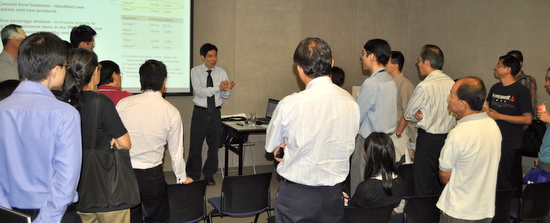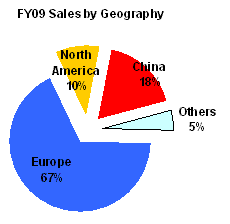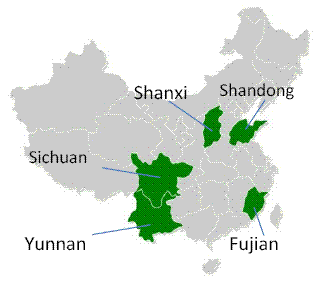
EVER WONDERED how the quality of house brands carried by retailers like Carrefour, Watsons and NTUC Fairprice compares with their pricier equivalent brand-name items?
Ask Sino Grandness, which cans fruit and vegetables within 24 hours after taking delivery of fresh produce from farms in China.
The Shenzhen-based food processor is the world’s top exporter of canned asparagus, a folate-rich vegetable popular in European cuisine.
It is also China’s top exporter of canned long beans, and one of its top 3 canned mushrooms exporters.

In FY2009, exports to Europe contributed two thirds of Sino Grandness’ revenues, which means it meets tough IFS/BRC standards exacted on food retailers there.
Lidl, a German discount supermarket chain with over 8,000 stores in more than 20 countries, has been its largest customer since 1997.
It also processes fruits and vegetables for house brands carried by world no.1 food retailer Walmart, but only for European outlets currently.
”We want to open up markets in other continents, such as US and Australia,” said Mr Parry Ng, its vice president of corporate communications, during an investor meeting at CIMB Investment Center yesterday.
Last November, it was finally registered as being compliant with US Food and Drug Administration guidelines.
|
|||||||||||||||||
It has not suffered from Europe’s debt crisis. In fact, sales to Europe rose 34.6% during the financial crisis in FY08, followed by another 10.9% increase in FY09.
Mr Ng believes the recession has caused consumers to switch to house brands, which are more affordable.
China’s growing affluence means domestic sales will be another key area of growth.
Its proprietary herbal drink, Baxian V Dongli, launched in China last year, generated maiden sales of Rmb 51.8 million.
In Mar, it launched its proprietary range of convenience fruit and vegetable juice, Xianluyuan, at a vege-fruit trade fair in Chengdu, and identified 20 distributors.
The management sees great growth potential in China, where per capita consumption of fruit juice was less than 3% of North America’s stable market as at 2006.

Photo: Leong Chan Teik
Below is a summary of the questions raised by investors yesterday and Mr Ng’s reply:
Q: Has it been easy to manage margins?
During the last quarter of each year, we first talk to our customers about price, and the volumes they want to purchase. Only after this do we lock in our cost price with farmers. Prices of agricultural produce are market knowledge. Good harvests mean we get lower prices from our customers, but it also means our costs are lower.
For the past 3 years, the price of asparagus per ton has decreased from Rmb 19,000-20,000 per ton to about Rmb 14,500. Despite this, our gross margins have held above 30%.
Q: What is your capital expenditure plan?
We spend about Rmb 60 million to Rmb 70 million a year on capex. This month, we announced plans to invest Rmb 150 million in a Hubei plant with capacity to produce 30,000 tons of canned products and beverages a year. Construction work will be stretched over 3 years until 2013.
Q: What are your working capital requirements?
We have sufficient internal resources unless orders for juices accelerate. If so, we may need to raise Rmb 100 million for advertising and promotion expenses, as well as provide for about 4 months of inventory to distribute in China supermarkets.
We are in a net cash position now but, to be honest, we may gear up within the next 12 months.
Q: Will the company pay dividends?
According to the IPO prospectus, we are targeting to pay 20% of earnings but this may be reduced if we need the funds to expand our juice business.

Q: How have you been affected by unpredictable weather patterns and floods?
About 30% of our production and procurement is outsourced in normal times. To-date, floods have not affected all China at the same time. It’s always been either in the north or in the south. So when one supplier is affected, we can buy from other parts of China.
During the Sichuan earthquake, we used more third parties and as a result, our gross margins were squeezed by 2% to 3%.
Q: Do you have long-term relationships with farmers?
Yes, many of them have been with us for 5 to 10 years.
Q: How are you affected by currency risk?
About 70% to 80% of sales are in USD, and the remaining is in Rmb. Impact in the past was not significant as the Rmb had been pegged to the USD. Now, we are expanding domestic sales, so the Rmb will contribute in an increasing proportion to top line. During FY09, we started selling canned foods under Walmart’s house brand in China.
As we do not deal in euro at all, we were not directly affected by its recent volatility. We are also adding new markets in the US, in China, and in Australia for the canned food business to reduce our exposure to Europe in the long run.
Sino Grandness is among the stock picks in TERENCE WONG: 'What I would buy with $1 m'







